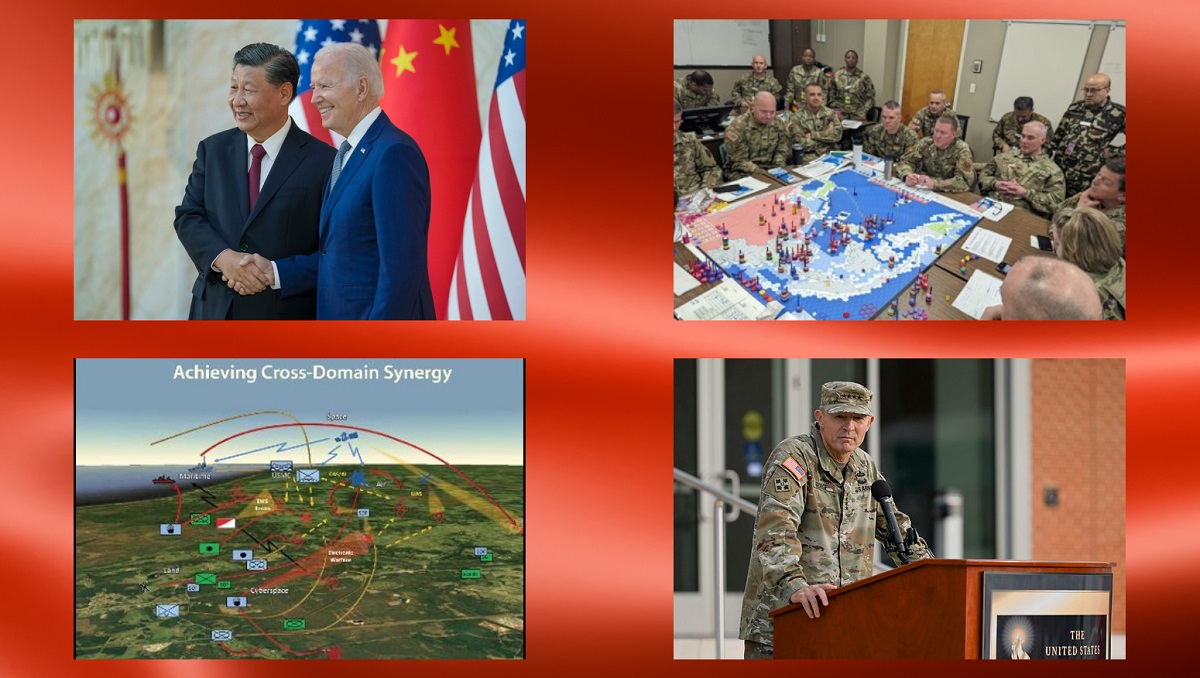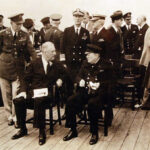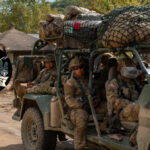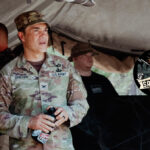
One of the priorities of U.S. Army Chief of Staff General Randy George is war fighting, particularly the charge to refocus and prioritize efforts that build lethality and cohesive teams. This follows previous guidance from the Joint Chiefs of Staff to focus on war fighting, ideally through wargames, and from Secretary of Defense Lloyd Austin to increase the classroom attention devoted to China, the Department of Defense’s pacing challenge. Zenel Garcia and Tom Spahr join podcast host Ron Granieri to discuss how the Army War College has adapted its curriculum to incorporate all that guidance and to better prepare graduates. The class of 2024 is the first to experience the newly designed China Integrated Course, which combines discussions of Chinese history, politics and strategy with a practical war-fighting exercise to cap off the core curriculum.
So I think it comes down to ambiguity…because war is unpredictable, and the further up you move from the tactical to the operational to the theater-strategic or strategic, I would argue, the more unpredictable it becomes it is more complex. So we are trying to prepare them to know how to plan and build, but understand that the situation is going to change as soon as the war starts.
Podcast: Download
Subscribe: Apple Podcasts | Spotify | Amazon Music | Android | Pandora | iHeartRadio | Blubrry | Podchaser | Podcast Index | TuneIn | Deezer | Youtube Music | RSS | Subscribe to A Better Peace: The War Room Podcast
Zenel Garcia is an Associate Professor of Security Studies in the Department of National Security and Strategy at the U.S. Army War College. His research focuses on the intersection of international relations theory, security, and geopolitics. Specifically, how interpretations of security and the geopolitical environment shape the discursive and empirical processes of regional formation and transformation in the Indo-Pacific and Eurasia.
COL Thomas W. Spahr is the Chair of the Department of Military Strategy Planning and Operations at the Army War College. COL Spahr has a Ph.D. in History from The Ohio State University and teaches courses at the Army War College on Military Campaigning and Intelligence.
Ron Granieri is Professor of History at the U.S. Army War College and the Editor of A BETTER PEACE.
The views expressed in this presentation are those of the speakers and do not necessarily reflect those of the U.S. Army War College, U.S. Army, or Department of Defense.
Photo Description: Clockwise from top left: President Joe Biden greets and poses for a photo with Chinese President Xi Jingping ahead of their bilateral meeting, Monday, November 14, 2022, at the Mulia Resort in Bali, Indonesia; Students in the USAWC AY24 Class execute their move in the China Integrated Course wargame; The 41st Chief of Staff of the Army, General Randy George, addresses Carlisle Barracks personnel during Root Hall ribbon cutting ceremony, October 25, 2023; Notional order of battle.
Photo Credit: Clockwise from top left: Official White House Photo by Adam Schultz; all others U.S. Army War College





Really good podcast, Gents! Nice balance of the various perspectives of “warfighting” which were all correct and useful. Thanks for focusing on the topic of warfighting as this is where our graduates can learn make a significant difference in deterring, preventing, and if need be – successfully prosecuting a conflict. Thanks.
We used to have a Red Team school….
Dr. Garcia and COL Spahr:
Question 1: Do either or both of you use Dr. Garcia’s “The Diplomat” article “Stop Calling China a ‘Revisionist Power:’ To Truly Understand the Impact of China’s Global Initiatives, We Need to Stop Thinking in a Status Quo-Revisionist Binary;” this, as a foundational matter in your China Integrated Courses?
Question 2: Do either or both of you believe that an improvement in the “warfighting” ability of the U.S./the West, this has been of late — and/or can be in the future — developed so as to deter, prevent, etc., the states and societies of the world (to include China) — and/or entities within the states and societies of the world (to include within our own states and societies here in the U.S./the West) — from fighting back so as to not be “transformed” more along ultra modern western political, economic, social and/or value lines?
As to this such second question, might we consider that the Islamists would not seen to have been “deterred” by our DoD of late — this, from fighting back against these such unwanted transformations — likewise the North Koreans, also, would not seem to be “deterred” by our DoD — from fighting back against these unwanted transformations — additionally the Iranians would not seem to have been “deterred” by our DoD — from fighting back against such unwanted transformations — the Russians and Chinese, also, would not seem have been “deterred” by our DoD — from fighting back against these such unwanted transformations — and even people here at home in the U.S./the West; these folks, also it would seem, have not been “deterred” by our DoD — this, from fighting back against such unwanted transformations.
(Thus, from the above, to understand “the kind of war [and, thus, the kind of “warfare?”] that we are embarked upon; neither mistaking it for our turning it into something that is alien to its nature?”)
Note that senior U.S./Western diplomats and/or soldiers — educated along the “warfighting” lines that I allude to above — these such U.S./Western diplomats and/or soldiers, one would think, could easily be assigned — not just to the Asian/Pacific to deal with Chinese, Korean, etc., resistance to unwanted transformation problems — but, indeed, could be assigned anywhere in the world; this, to deal with unwanted transformation problems found both here at home and there abroad?
Also note that — from the non-specific to and/or exclusive of China “problem” perspective that I provide above — how senior U.S./Western diplomats and/or soldiers would need to be able to see how such “resisting transformation” nations such as China, Russia, N. Korea, Iran, etc. — and even “resisting transformation” entities here at home in the U.S./the West — how these such entities (a) might be (must be?) seen as the natural allies of one another and, thus, (b) may need to be (must be?) seen and dealt with in a more holistic manner?
Re: the China Integrated Course, if (a) “war is more of a cognitive problem than a physical problem” (from a COL Spahr reply-to-comment in the 2021 WRB article “Reframing the Mission in Afghanistan”), if, accordingly, (b) “the information war is more important than any battle that we could ever fight” (same COL Spahr reply-to-comment) and if (c) “the best approach in war is to first attack the enemy’s strategy” (Sun Tzu?), then — based of these such premises — should not our “war games,” re: China, proceed more along the “cognitive”/the “information war”/the “attack the enemy’s strategy” lines noted by LTG (ret.) Cleveland and GEN (ret.) Votel, et. al, below?:
“The Achilles’ heel of our authoritarian adversaries is their inherent fear of their own people; the United States must be ready to capitalize on this fear. … An American way of irregular war will reflect who we are as a people, our diversity, our moral code, and our undying belief in freedom.” (See the “Conclusion” of the Rand paper “The American Way of Irregular War: An Analytical Memoir” by Charles T. Cleveland and Daniel Egel.)
“Advocates of UW first recognize that, among a population of self-determination seekers, human interest in liberty trumps loyalty to a self-serving dictatorship, that those who aspire to freedom can succeed in deposing corrupt or authoritarian rulers, and that unfortunate population groups can and often do seek alternatives to a life of fear, oppression, and injustice. Second, advocates believe that there is a valid role for the U.S. Government in encouraging and empowering these freedom seekers when doing so helps to secure U.S. national security interests.” (See the National Defense University Press paper “Unconventional Warfare in the Gray Zone” by Joseph L. Votel, Charles T. Cleveland, Charles T. Connett, and Will Irwin.)
Problem:
Around half of Americans today no longer seem to embrace such things as “our diversity, our moral code, and/or our undying belief in freedom,” these such Americans, in truth, no longer seem to see authoritarian leaders as “bad” and, accordingly, these such American no longer seem to wish to help those who “seek alternatives to a life of fear, oppression, and injustice.”
In these such circumstances, just how capable — and/or how credible — would the U.S. be today; this, if we wished to mount an information war — a defeat the enemies strategy campaign — along the lines (a) recommended by LTG Cleveland and GEN Votel, et. al., above and (b) suggested by Sun Tzu?
As to the “difficult realities” that I present in my comments above — and, these, as relates to the China Integrated Course and related “war games” — should not the following “difficult reality” also be incorporated somewhere therein?:
Possibly the best example of “deterrence” that I have seen, this is the current effort that we see coming from “opponent” entities such as China, Russia, Iran, N. Korea, the Islamists — and from “opponent” entities here at home in the U.S./the West — who, commonly it would seem, seek to “deter” the U.S./the West from (a) trying to transform the world more along ultra-modern western political, economic, social and/or value lines and from (b) trying to work more “by, with and through” the more “liberal”/the “pro-change” elements of the world to achieve these such goals. (Threat: If these such U.S./Western “revolutionary change” efforts are successful, then, as a minimum, this will cause a loss of power, influence, control, status, privilege, safety, security, etc., by the “opponent” entities that I describe above.)
As a means of trying to “deter” the U.S./the West — from continuing to pursue our such “achieve revolutionary change both at home and abroad” goals — China, Russia and others have — very logically and rationally it would seem — determined that they will impose a “cost” on the U.S./the West — a “deterrent” “cost” great enough so as to cause the U.S./the West to reconsider whether (a) the potential “benefits” of our such desired “transformative” actions; whether these benefits are outweighed by the very real “costs” (for example, massive instability both at home and abroad) that the U.S./the West is having to pay — this, in order to, possibly, achieve achieve these such goals.
The manner by which China, Russia, etc., have chosen to pursue their such “deterrent”/their such “cost imposing” objectives, this is by, for example, (a) trying to transform the U.S./the West more along authoritarian lines and by (b) working more “by, with and through” the more “conservative”/the more “no-change” (and/or reverse already realized but unwanted change) elements within U.S./Western and other societies. (Threat: If these such Chinese, Russian, etc., efforts are successful/continue to be successful along these lines, then this, as a minimum, will cause a loss of/the continued loss of power, influence, control, status, privilege, safety, security, etc., by the current rulers/regimes of the U.S./the West.)
Conclusion Question:
If such things as the Brexit, the election of President Trump, the events of January 6, 2021, the rise of “conservatives” everywhere, the move toward authoritarianism in many locales throughout the world and instability both at home and abroad; if these are any indication of our opponents’ success, then the ‘cost” imposed on the U.S./the West — by such entities as China, Russia, etc., — these, indeed, would seem to have had — and will continue to have — (a) a very significant “deterrent” effect on the U.S./the West, this, (b) as relates to our (now somewhat abandoned both at home and abroad because of same?) goal to transform the world more along ultra-modern U.S./Western political, economic, social and/or value lines?
(This such “difficult reality,” thus, to also to be incorporated into the China Integrated Course, and the “war games” related thereto?)